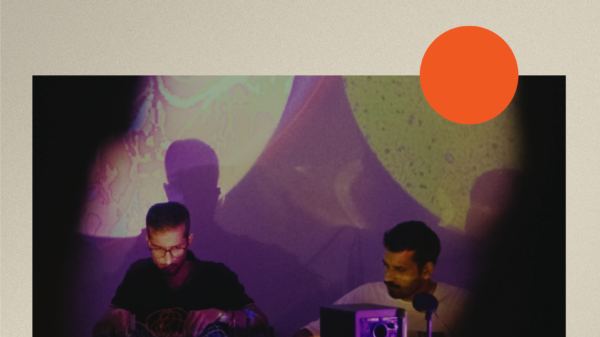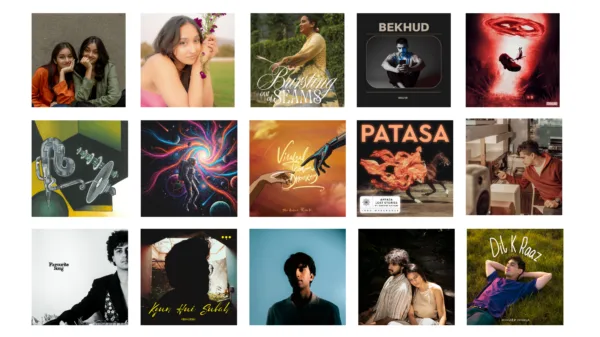Across all borders, a truth remains: a woman’s worth is largely made up of what she can do for the world that she inhabits. For the people in it, for the people that she might further populate it with, for the social mores and traditions, for the past and the future, and everything in the time in between. Rarely are her attempts to break free of this universal caregiver role lauded. More often than not, she is vilified for the thought itself. Progress comes in waves, but this truth still remains. A woman’s focus on her own personhood is an act of brazen selfishness.
The artist Sheherazaad grapples with this slanted reality on her EP “Qasr”. A five-track exploration of the disillusionment and guilt surrounding the mythos of the female identity, the San Francisco-born singer-songwriter doesn’t arrive at the answers any more than one ever could. But she tries her best to unravel all the threads in a melancholic record, where her silences are punctuated by her sparse lyrics on a tonal landscape that feels vast, with no horizon in sight. Over the 23-minute runtime of the project, she evokes a dissonant sense of claustrophobia that comes with loneliness, like feeling suffocated in an empty desert. It makes little sense, and yet is real.

These questions she deals with are made even more complex by some of the artist’s own history. A South-Asian child raised in a land not theoretically her own, in a house brimming with the sounds of Indian legends like Lata Mangeshkar and RD Burman (thanks to her parents, the lead singer and pianist of a Bollywood cover band), music seemed to be thrust upon her. And then a revelation happened: after years of being a naturalised speaker of English, she became disenchanted with the language and its colonial roots, and all that it entailed for someone of her descent to be using that to express emotions. The artist took that as an opportunity to relearn her own impulses, and became drawn to the Hindi, Urdu and Arabic languages, resulting in her musical voice to strictly have a South-Asian linguistic flavour. On a project untangling the threads of identity, the artist’s own mission to decolonise the language she dreams in becomes an act of rebellion in itself. On this EP, there are five different narratives with a woman at the centre of it. Whether they are the same woman or entirely different ones isn’t the point as much as the push and pull that the artist deals with being the mouthpiece for them all, and how that manifests across the project’s soundscape as a whole.
The opening track “Mashoor” paints a portrait of a woman troubled by newfound fame. Although the title could literally be translated as “famous”, the Urdu word could very well connote a more cautionary implication of notoriety, which would fit this tale of a self-serving and uncertain woman in this sinister narrative of individuality and guilt. The next track “Dhund Lo Mujhe”, produced by Grammy-winner Arooj Aftab, is a surrealist and symbolic image of isolation. With the words explicitly taking a voyeur’s approach to enigmatic, mad, hedonistic women, ending with literal cries for help and companionship. The third track “Koshish” is a conclusion and a wistful goodbye to what seems to be an uneven romantic relationship of youth, an age which has ended. Here the female protagonist laments about giving her all and more, and despite that, her trials having been for naught. A tired farewell to the artist’s idealism and innocence. The penultimate track “Khatam” is a somber reflection of a long journey where the destination or the point seems to elude the central character. A nihilistic take on plans and battles, where at the end of the day, the day ends. The last track tells the story of “Lehja”, a woman who seems destined for doom and gloom. Lehja’s voice is imprisoned since birth, but she finds a way to turn her forbidden predicament into a way out, to freedom, a distinct dawn-after-dark note to end the tale on.

The artist Sheherezaad breaks up the meaning of her name into two simple words: “free” and “city”. She has spoken of how she is intrigued by the idea that a woman could very well be a city all contained in herself – in many ways, a fitting name of the storyteller of this record. However, another tangent comes to mind: one of the artist’s beloved characters from One Thousand and One Nights, and her namesake. Trapped into a lose-lose situation, Scheherazade of the folk tales devises a plan to ensure her mortal survival, spinning long tales that are bigger than herself, behind the intrigue and suspense of which she hides and breaths another day. The heroine of the story has a name that refers to her provenance (čehr meaning “lineage” and āzād meaning noble), a logic making her a Middle Eastern counterpart to the Snow Whites and Sleeping Beauty. A woman of a noble lineage whose privilege didn’t spare her from the fate of the others of her gender at the hands of a ruler. Left to make up her worth based solely on the curiosity she conjured, much like the heroine of this album.



























